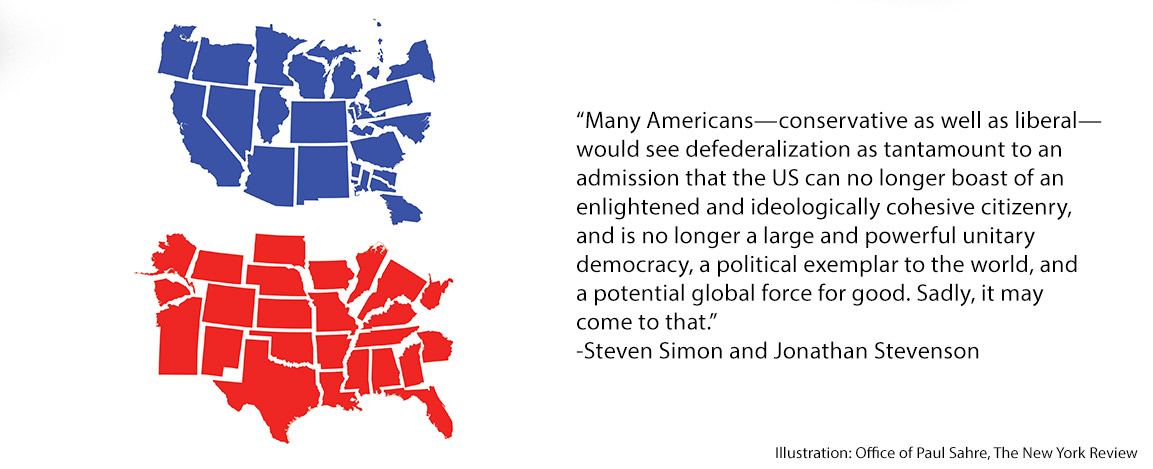It is time to consider a radical solution to stave off the prospect of political violence and even civil war in the US. Steven Simon and Jonathan Stevenson's newest piece, published here in The New York Review of Books. Featured below is an excerpt.
The Ukraine war and global economic troubles momentarily overshadowed domestic discord in the United States earlier this year, but it didn’t go away. The groundless insistence by former president Donald Trump and his supporters that the 2020 election was stolen, Republican efforts to limit voting rights and to install state officials willing to disregard adverse election results, and the activity of far-right militias that orchestrated the insurrection in Washington on January 6, 2021, have all continued. Trump is bent on vengeance, and he intends a sweeping replacement of federal civil servants with loyalists if he is reelected president in 2024.
In June the Supreme Court handed down a series of grossly retrogressive decisions on guns, abortion, and environmental regulation that have threatened America with fragmentation to a degree not seen since the Civil War. The midterm elections in November may well make political conflict more likely. If, as could happen, control of the House and Senate flips to the Republican Party, legislative gridlock in Congress is practically guaranteed, as is a slew of partisan congressional investigations into President Joe Biden and his administration. These could lead to his impeachment despite the absence of any plausible “high crimes and misdemeanors.” Democrats will be outraged, while Senate Republicans will be unlikely to have the votes to convict him.
Several commentators have suggested that, historically, radical swings in domestic politics and virulent strains of racism and fascism have in fact been normal in the United States, and that talk of prospective large-scale political violence is therefore overblown. But the breadth and depth of the present threat to the country seems unprecedented in post–Civil War America. Among other things, the conflation of Christianity and Republican politics fostered by political elites and powerfully felt at the grassroots level is encouraging absolutism on the right. Political rallies for Republican candidates and causes, especially those anticipating Trump’s second coming, are increasingly infused with religious language and symbols, and feel akin to evangelical revival meetings. Studies of militant Islamist movements have highlighted the dangers inherent in sacralizing political grievances. Once secular policies are interpreted by their opponents as impious challenges to God’s rule, compromise becomes apostasy.
Emancipation of the enslaved in 1863, the defeat of the Confederate states in 1865, and postwar Reconstruction did not prevent the reestablishment of an informal confederacy. The imperative of reincorporating the South into the Union led northern elites to tolerate and eventually internalize the gauzy southern myth of the Lost Cause: a gracious agrarian culture, guided by an honor code and a noble aristocracy, that was defeated by a soulless industrial society. Contemporary Republicans have refashioned that myth into one of a predominantly white, Christian America that other races and cultures have compromised and that is bound to perish unless prompt and decisive action is taken; that is the fundamental if unspoken meaning of Trump’s “Make America Great Again.”
The US now appears to be in a state of “unstable equilibrium”—a term originating in physics to describe a body whose slight displacement will cause other forces to move it even further away from its original position. Political analysts have applied the term to countries on the brink of civil war, like Lebanon and Syria. But could the US really descend into political violence and perhaps even civil war, as commentators such as Stephen Marche and, less breathlessly and more systematically, Barbara F. Walter have suggested?
Read the full article here.




